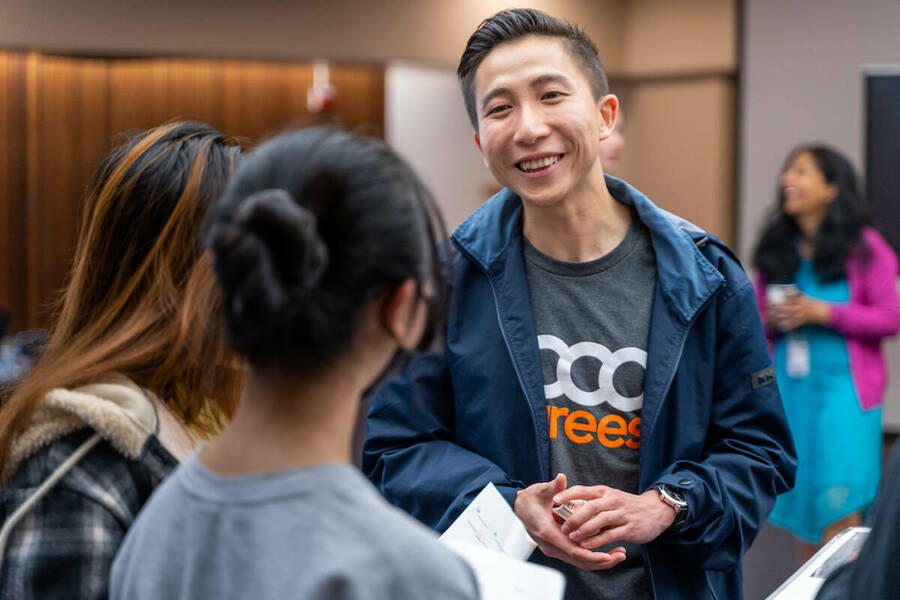College Access - 10,000 Degrees

Locations
- College Access - 10,000 Degrees, California
Focus Area
- Education
We believe that meeting students where they are with timely information, guidance and self advocacy, financial resources and ongoing support is the key to moving students who may not have envisioned themselves with a place in higher education—into and thru their postsecondary pathways. Our programs are grounded in the community—complementing existing resources and providing an unwavering belief that every student deserves the opportunity to achieve their educational dreams.
The Issue
The payoffs for completing a bachelor’s degree are high: on average, workers who work full-time, year-round with a bachelor’s degree make 114 percent more than those with a high school degree. Despite this, fewer than 60 percent of students in the United States who initially enroll full-time at a four-year institution will earn a bachelor’s degree within six years. The challenge is even greater for low-income students. Among students in the lowest quarter of incomes, only 26% completed their bachelor’s degree within six years.
These lower rates of college persistence and completion, as well as greater educational debt, are caused by many things. For example, financial aid letters may include inadequate support for their needs, and they may have additional pressure from financial obligations outside of school. First-generation low income students also enter college with limited access to professional networks and mentors. Without a supportive network, they are left with limited clarity and understanding of the path to college success. Combine this with the lack of sense of belonging that many of these students feel at their colleges, and completing college then becomes extremely difficult.
The Intervention
Low-income students face numerous obstacles to completing college. 10,000 Degrees — an equity-focused scholarship provider and college success nonprofit in California — seeks to address those obstacles. Their College Success program offers scholarships, training, and advising to primarily low income, first generation college students from the San Francisco Bay Area.
Participants in the 10,000 Degrees College Success program receive a scholarship to use toward educational expenses, as well as the opportunity to receive proactive advising from a College Success Fellow. These Fellows are full-time staff who are recent college graduates themselves. Many are alumni of 10,000 Degrees programs, so they have a similar background to the students. These Fellows text, call, and reach out in-person to students, helping them learn how to advocate for themselves on their campus, connecting them with resources for basic needs, supporting them in completing annual financial aid forms, and generally helping students navigate college life and academics. Students may also receive support around preparing for post-college life, including resume writing, interview skills, and connection to internships and career programs.
Research Question
What is the impact of providing proactive, intensive advising to 10,000 Degrees’ College Success scholarship recipients on their educational outcomes?
Intended Outcomes
10,000 Degrees aims that the students who receive their advising will have:
- Improved persistence from the first to second year of college
- Increased full-time enrollment for following semesters
- Decreased debt
- Increased likelihood of attaining a bachelor’s degree within four years
Research Study Design
LEO will use a randomized controlled trial (RCT) design to evaluate the impact of advising within the 10,000 Degrees College Success program. The College Success Fellows currently have caseloads of more than 250 students each, leaving them overwhelmed and in need of time. Due to this, 10,000 Degrees does not have the resources necessary to offer this proactive, intensive advising to all recipients of its College Success program.
Students in the College Success Scholarship program will be randomly selected into a treatment group, who will receive this proactive advising from a Fellow, and a control group, who will receive standard scholarship support and connection to other financial aid assistance. Each Fellow will be assigned to about 25 new advisees each year, for a total caseload of approximately 100 students.
By comparing the outcomes of students who randomly received access to proactive advising to those who did not, LEO will be able to isolate the effect of the advising on student outcomes. Importantly, by using random assignment, this research design ensures that the researchers can generate causal evidence on the impact of providing proactive advising. The results of this study will help 10,000 Degrees continue to improve their College Success program so that they can best help students complete a four-year college degree. If their intensive advising is found to be effective at promoting college completion, they hope to be able to expand this aspect of the program.